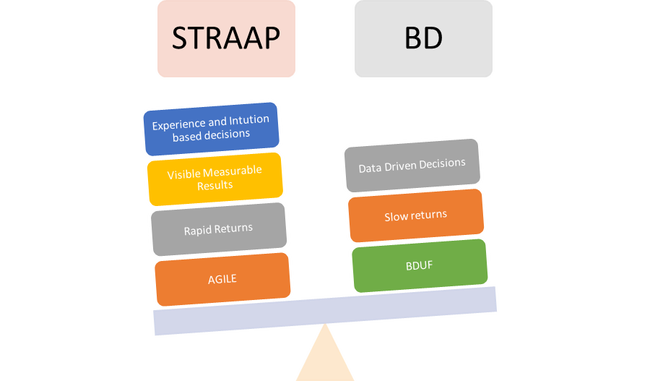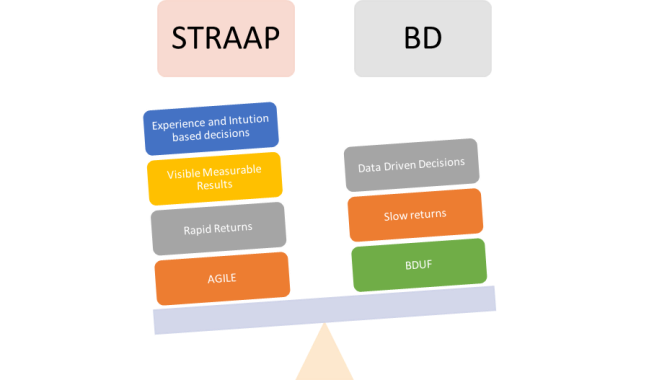Having seen business trends come and go I am as excited as others about the up coming big data inflection. This will be one of the biggest changes in how we operate as businesses ever to happen. The data revolution round managing systems will be as significant as the industrial revolution was in former years. Productivity will be increased, waste reduced dramatically creating a greener more manageable and profitable business environment.
We all await the outcomes of big data. What in particular can we learn from the data we store and process within our organisations? A question for many which is as yet a far away dream as not all data is collated and the relationship between almost all data sets remains to be defined by statisticians and company stakeholders alike. Big data no doubt has big promise but it is a science which takes time to execute against.
Big data in essence is the PRINCE 2 “big design up front,” while strategy as a service supported by Strategy as a platform is the AGILE methodology.
Big data has huge upfront costs and barriers to entry involved in starting the process, while I would argue strategy as a service (STRAAS) would not hold the same limiting constraints.
The majority of SME company executives work in and not on their businesses. It’s difficult for executives to secure the time needed to consistently adapt strategy and set effective metrics for business improvement, particularly on a sustained consistent basis.
In essence executives see that if they stop focusing on the day to day running of the business that the business would fail, and yet also most can see the dichotomy that if they focus only inside the business that they could fail.
Banks on an adhoc or at least non consistent basis demand business plans. When this occurs the practical need of the executive is to work on the business, in order to fulfil a need for consistent funding or bank support, and yet after this is carried out, the world moves on and most plans are out date inside 3-6 months.
The answer could indeed be strategy as a service supported by strategy as a platform. An aligned consultant who consistently jumps in and out of a business assisting the executive can add tremendous value. This could of course be a non executive, but within the small business few boards evolve beyond an advisory board, and ad-hoc non structured advice from individuals is often not what an executive needs.
Corporates often have strategy as a platform built into their “DNA.” The platform may not be optimum but on the other hand the platform always exists to some degree, and in a corporate some particular structure, or way of doing things is always better than lacking any structure at all.
Small businesses often can only afford a single advisor, or alternatively associate themselves with loosely connected advisory boards. Which ever the case
Is there a place for platforms which offer strategy for the SME? The possibility to go further to automate the relationships between executives and their advisors in order to improve company outcomes in a way that is standardised and trusted by both executive and advisor would no doubt benefit and support an improved growth trajectory for SME’s.
To use the wood for trees analogy. We need to know the right time to climb the tree and make sure we are going the right direction, while at the same time walking the distance and ensuring we put in enough travel time to get to the destination.
As an example could strategy as a platform (STRAAP) suggest a monthly review of sale targets against actual performance? Could it review performance against suggested product milestones, in a semi automatic fashion?
Could a platform regularise advisory board meetings, setting structured agendas, and questions for the executive to answer to and effectively normalising good practice within the SME.
Could software in essence manage and prioritise the elements of business a particular executive may dislike and hence improve performance in these areas?
Would an advisor and executives relationship benefit from automated suggestions of good practice at a time relevant to when key decisions have to be made?
The answer for me to all of the above is a resounding yes, and I would argue the benefit of “strategy as a platform” deployed by consultants over big data in a small/medium sized enterprise would no doubt improve company outcomes at a quicker and more sustainable rate, than waiting for a data inflection inside a company. When companies are expected to manage themselves or when areas of core company expertise are left to third party contractors there can always be an emerging problem on the horizon.



Recent Comments